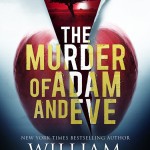My new novel “The Murder of Adam and Eve” is an allegory loosely inspired by an allegory, as well as the scientific explanation of our species’ origins.
The allegory is the Genesis story of the Bible, and even non-believers are generally familiar with Adam and Eve, the Garden of Eden, and the infamous apple. Such a fruit wound up on the cover of my book, although there are no apples in my novel’s text.
 But parallels are fairly obvious. My teen heroes, Nick and Ellie, are catapulted by a time wormhole to a prehistoric East Africa that is Eden-like as wilderness: little changed yet by the primitive humans who live there.
But parallels are fairly obvious. My teen heroes, Nick and Ellie, are catapulted by a time wormhole to a prehistoric East Africa that is Eden-like as wilderness: little changed yet by the primitive humans who live there.
When I visited Africa and witnessed different species peacefully drinking side-by-side at waterholes, I was reminded of pictures from a Childrens’ Bible.
Scientists know how resonant this story is. They got a lot of media attention by naming their hunt for our genetic ancestors after the religious Adam and Eve. My own characters fill those roles in more ways than one.
In my book, humankind’s impending leap from the African continent to the rest of the planet, and from a simple hunter-gatherer existence to civilization, are echoes of the Biblical expulsion from Eden and eating from “the tree of knowledge of good and evil.” It’s rich material for a novelist.
Which got me curious about what the Biblical origin story really means. Turns out (no surprise here) that religious leaders don’t agree. And ordinary folk range from literal belief to utter dismissal.
The Western Christian tradition is that Adam and Eve sinned by disobeying God and that this sin was inherited by the rest of us, an inheritance overcome by the sacrifice of Jesus, baptism, and so on. Early Christian fathers put the blame on a serpent, then the woman Eve, and finally a reluctant Adam, in that order.
About a quarter of the world’s population identifies with faiths that adhere to this tradition.
Jews, Muslims, and Orthodox Christians do not subscribe to the Original Sin idea, however, and Eastern, African, and indigenous faiths don’t buy the Adam and Eve story at all. If you look at the statistics, religion (or the lack thereof) is one area in which everyone on the planet is in the minority, since there is no faith (or lack of it) that a majority adheres to. (Wikipedia has the numbers.)
There is also disagreement, I learned, about whether Eden was supposed to be a spiritual or earthly paradise, whether the “serpent” was a literal snake or an allegory for temptation, whether the serpent was Satan or if Satan entered the picture later (as Muslims believe), and what the tree and apple represent.
One idea is that “good and evil” means human realization of right or wrong, a morality that lifts us above animals. Another is knowledge, period. And another is god-like powers, or god-like ego, that got us into the trouble with the Creator.
An interesting facet of the Genesis story is its suggestion of a common ancestor, which is also a tenet of evolution. Not the same ancestor, however!
I first heard the Genesis story from nuns at Catechism, and objected even then. To me, the apple was like putting candy in front of toddlers and then instructing them not to eat. I didn’t like the idea of inheriting sin from a deed I had nothing to do with, or the nuns’ suggestion that women were more to blame than men. As I grew older, the entire tale seemed preposterously medieval. I read Mark Twain, who had devilish fun mocking it.
But as a storyteller, I’m fascinated by stories with staying power, and Adam and Eve are the granddaddy (and grandmommy) of them all. It’s an attempt to explain both our origins and our life condition, and thus has fascinated people – including me – for at least 2,500 years.


{ 1 comment… read it below or add one }
I’ve read, and enjoyed, all the Ethan Gage novels so periodically I check to see if you’ve written anything else. I don’t understand how between you (my favorite authors), you can’t write novels as fast as I read them
I’m torn regarding this book. I am a Christian and, while I take the Bible literally, I mostly disagree with the conclusions most religions and Christians have regarding it so I’m not quite as dogmatic as most. Or perhaps my dogma just isn’t mainstream. In either case, while I don’t mind intelligent speculation, I get tired of authors poking fun at those of us who “believe,” regardless of what we happen to believe. So, while I’m intrigued by the subject, I’m reluctant to spend my money, and more importantly my time, on a book that I may throw down in disgust after a few chapters.
It would be helpful if you could give better hints as to where you’re going with this.
Oh well. I’ll look for reviews and decide in time.
Pat